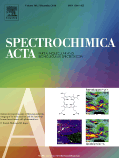 A spectroscopy journal has retracted a 2016 study after concluding that its editors had been misled by a fake review.
A spectroscopy journal has retracted a 2016 study after concluding that its editors had been misled by a fake review.
According to the retraction notice, the journal — Spectrochimica Acta Part A: Molecular and Biomolecular Spectroscopy — accepted the paper due to positive feedback from someone assuming the identity of an expert reviewer, using an email address provided by the author of the study.
An official from the author’s institution in Turkey informed us that it will conduct an investigation.
Here’s the retraction notice for “Diagnosis of cervical cancer cell taken from scanning electron and atomic force microscope images of the same patients using discrete wavelet entropy energy and Jensen Shannon, Hellinger, Triangle Measure classifier:”
This article has been retracted at the request of the Editors.
After a thorough investigation, the Publisher has concluded that the Editor was misled into accepting this article based upon the positive advice of at least one suggested reviewer report. The report was submitted from an email account provided by the author, that was later determined not to be the email of the supposed expert reviewer.
This manipulation of the peer-review process represents a clear violation of the fundamentals of peer review, our publishing policies, and publishing ethics standards. Apologies are offered to the reviewers whose identities were assumed and to the readers of the journal that this deception was not detected during the submission process.
The paper, which was published in February this year, has yet to be cited, according to Thomson Reuters Web of Science.
Sevcan Aytaç Korkmaz, the author of the now-retracted paper from Fırat University in Elazığ, Turkey, is still based at the institution, according to the university’s vice rector, Halil Hasar.
Hasar told Retraction Watch:
As administration of Fırat University, we haven’t any information about the retracted paper published in Spectrochimica Acta Part A: Molecular and Biomolecular Spectroscopy. Therefore, up to now, the committee hasn’t [conducted] any ethical investigation.
But, he added that Korkmaz
will be investigated as academic fraud for publishing the paper by our ethical group according to laws…
Hasar went on:
On behalf of each member of Fırat University, the administration is very sorry for such a shameful situation.
Christian Schulz, a publisher at Elsevier (the journal’s publisher), told us:
We have no way of knowing with certainty which individual submitted the review. We can only confirm that the review was submitted from a reviewer account created by the Editor in good faith, using an email address provided as a ‘’suggested reviewer’’ during the submission process.
Schulz declined to name the reviewer who was impersonated:
Since there is no reason whatsoever to suspect any involvement of the real person whose name was used as the suggested reviewer, it would not seem fair to share their name publicly.
And when asked if Korkmaz agreed to the retraction notice, Schulz added:
The author was sent the retraction notice in advance and some of her comments were taken into account in the final version.
We’ve reached out to Korkmaz, and will update the post with anything else we learn.
In total, we’ve counted well over 300 papers that have been retracted for faked, rigged or compromised peer review. Here’s our 2014 Nature feature on the phenomenon if you need a bit more background.
Like Retraction Watch? Consider making a tax-deductible contribution to support our growth. You can also follow us on Twitter, like us on Facebook, add us to your RSS reader, sign up on our homepage for an email every time there’s a new post, or subscribe to our new daily digest. Click here to review our Comments Policy. For a sneak peek at what we’re working on, click here.